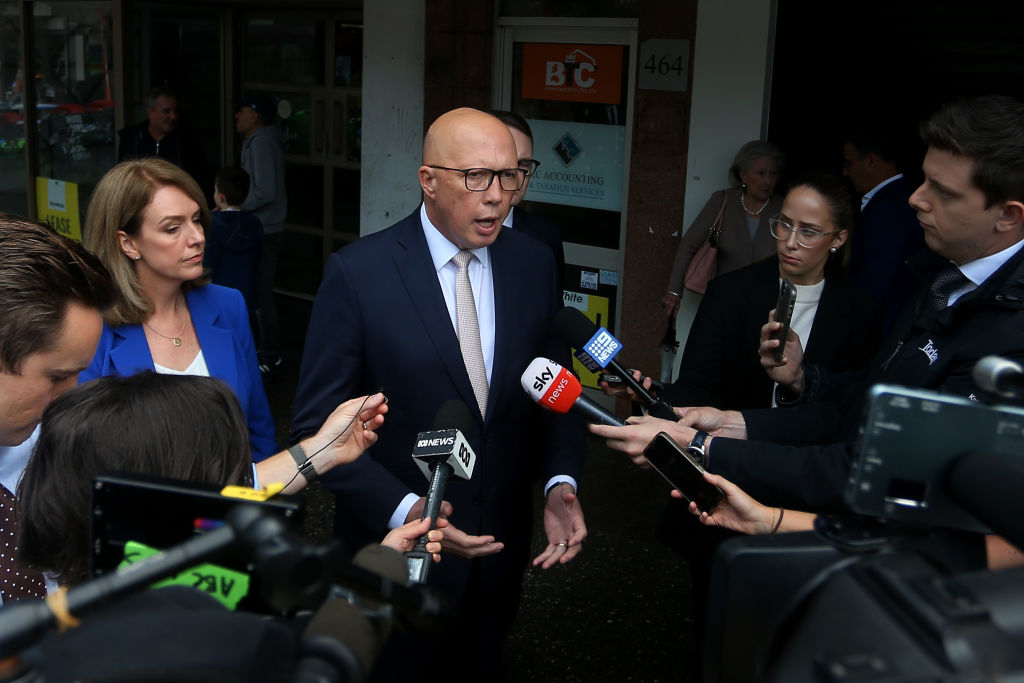Opposition leader Peter Dutton has today nominated seven sites where he says a future Coalition government would construct nuclear power plants. For the benefit of international readers, this would be huge shift for Australia, which presently has no nuclear energy production.
Dutton has framed the policy as a response to climate change, seeking to exploit doubts about the reliability of renewable energy sources such as wind and solar. Dutton’s move has been cast in media commentary as restarting the “climate wars”.
“I’m very happy for the election to be a referendum on energy,” Dutton says.
AUKUS was a stepping stone that has led Dutton to this next stage.
Three years ago, Scott Morrison unveiled the nuclear-powered submarine plan. It’s easy to forget what a shock this involved. The idea was previously unthinkable. But Morrison dragged the nation across the Rubicon, and Labor, then in opposition, quickly jumped aboard.
Morrison had actually flirted with the dream of a nuclear-power industry at the time of negotiating the submarine deal, according to a recent report in The Australian, which observed that “the politics of securing AUKUS and a domestic nuclear energy program simultaneously would have been overly ambitious.”
But AUKUS was a stepping stone that has led Dutton to this next stage. And he looks to have read the public mood. The Lowy Institute Poll this month found 61% support either strongly (27%) or somewhat (34%) for “Australia using nuclear power to generate electricity, alongside other sources of energy”. On the acquisition of nuclear-powered submarines, almost two-thirds of Australians remain in favour.
These are remarkable results compared to where Australia has come from. Only a few decades ago, more than 250,000 Australians protested on the streets over nuclear issues. Opposition to uranium mining was the activist issue of choice. The disarmament movement had enough support to elect senators. France’s nuclear testing in the Pacific sparked an outcry that forced to government to recall the Australian ambassador in Paris. Debate over uranium sales to India split the Labor party.
A major deterioration in regional security coupled with nationalist sentiment could become powerful drivers.
So, with the nation adapting to uncertain times by proposing polices once thought impossible, what about the next step? Should Australia complement its nuclear power industry and nuclear-powered submarines with an arsenal of nuclear weapons? Australia has had atomic ambitions before.
Public support appears tepid. In 2022, after the AUKUS plans had been unveiled, the Lowy Institute Poll reported 36% of Australians in favour of acquiring nuclear weapons in the future. Still, that was higher than the 16% in favour in 2010, when Australians were asked if they would support developing nuclear weapons should near neighbours do the same. Attitudes can shift. Asked in 2011 whether they favoured Australia building nuclear power plants as part of its plans to cut greenhouse gas emissions, only 35% agreed.

Big international shocks might encourage more Australians to support the development nuclear weapons. Vladimir Putin making good on threats to unleash a nuclear strike over the invasion of Ukraine, for example. Or an act of naked aggression by China.
Australians might also want to follow should partners take concrete steps. Japan is one country that is already assumed to have a latent nuclear weapons capability, a “bomb in the basement”, with the technical know-how of a full nuclear fuel cycle. South Korea’s President Yoon Suk-yeol warned in January that threats from North Korea might drive him to seek tactical nuclear weapons “if the problem becomes more serious”.
And while a nuclear-armed Australia would complicate relations with neighbours, particularly Indonesia and the Pacific, a major deterioration in regional security coupled with nationalist sentiment could become powerful drivers.
The question of cost is confronting. Building and maintaining nuclear weapons requires immense expenditure. It would be a massive investment, technically challenging, and run afoul of Australia’s international commitments. These are all the same reasons people have for so long dismissed the idea of Australia obtaining nuclear-powered submarines.
You can start to see the way a political argument in favour of nuclear weapons could be made. Strategic dangers are swirling. China is rapidly expanding its nuclear stockpile. The nuclear non-proliferation treaty signed in the 1960s is outmoded, much as was the argument when effectively exempting India over its nuclear weapons program.
Dutton, to be clear, is talking nuclear power, not weapons. But given the upheaval of recent times, who could confidently say never? Australia’s nuclear politics have dramatically changed.

